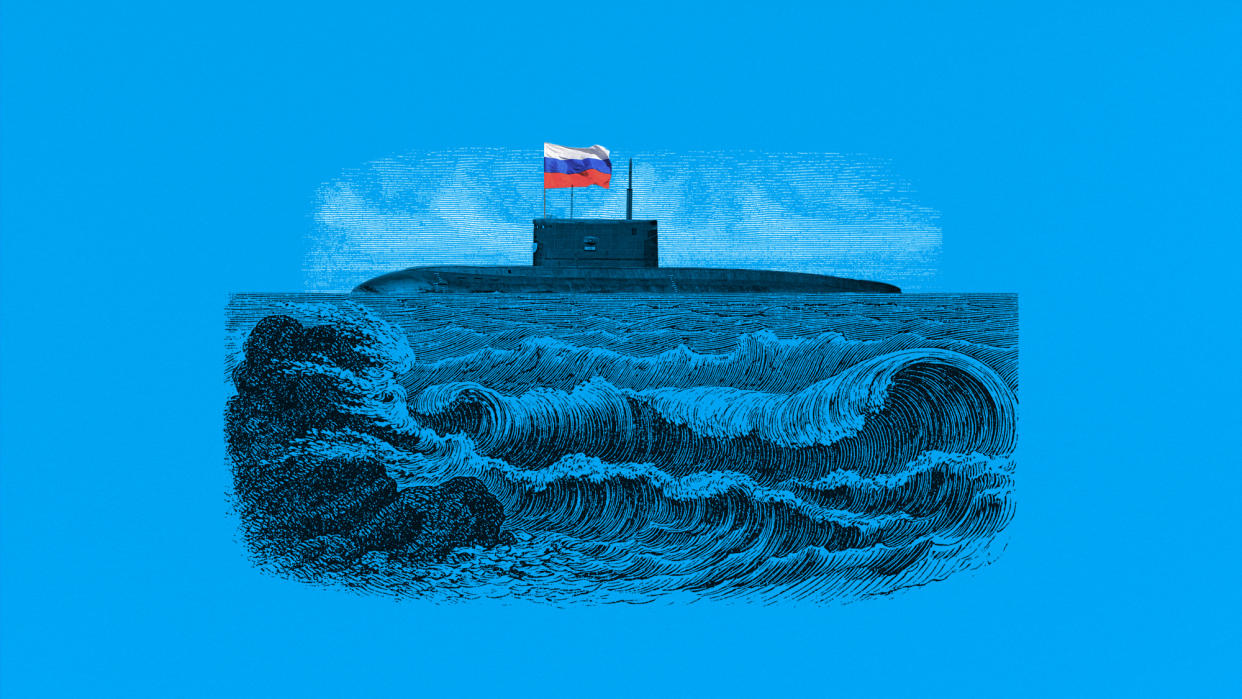Are the Baltics under threat?

- Oops!Something went wrong.Please try again later.
The Baltic states – former Soviet colonies who are among Russia's most outspoken critics – fear they are facing an increasing threat of retaliation for their enthusiastic Nato membership and support for Ukraine.
More than 750 schools and kindergartens across Estonia, Latvia and Lithuania received emailed bomb threats last week. Lithuania's police chief called them "a coordinated mass attack", according to The Associated Press in Vilnius (the site of the latest Nato summit) – with the majority of messages in Russian, some with a political message.
A spokesperson for the Lithuanian security agency told the Baltic News Service that the messages were likely "carried out at the initiative of hostile states" and aimed at "increasing mistrust". "As geopolitical tensions rise, Lithuania and the other Baltic states are constant targets of information and cyber-attacks by hostile states," Aurelija Vernickaite said.
Earlier this month the undersea pipeline between Estonia and recent Nato member Finland also "ruptured", cutting the flow of gas between the two countries in what authorities believe may have been a "deliberate act of sabotage", reported Reuters from Stockholm. Finnish police have completed their crime scene investigation into damage to the Balticconnector pipeline, describing signs of an "extremely heavy object" that had been left on the Baltic seabed.
Swedish authorities revealed last week that an undersea communications cable between Sweden and Estonia had been partially damaged, with the cause still unclear. Estonia reported a drop in capacity on the cable, which the country's communications ministry said occurred at roughly the same time and in the same area as damage to the Balticconnector pipeline.
Regional officials are "treading carefully" in public, said The Economist, but privately, they "strongly suspect that Russia is involved". This series of "suspicious incidents" has led to fears that "Russia is making mischief underwater".
It comes after Russia shut off the Nord Stream 1 and 2 pipelines to Germany via the Baltic Sea last year. The pipes were found to have been severely damaged by four explosions in what Nato declared a deliberate act of sabotage. Russia was initially suspected of involvement, although others have pointed the finger at Ukraine.
What did the papers say?
"Pity the Baltic sea-creatures who just want a quiet life," said The Economist; "their patch has never been busier."
This month leaders of the Joint Expeditionary Force, a British-led alliance of 10 northern European countries including Estonia, Finland and Sweden, met on the Swedish island of Gotland to discuss the possibility of Russian threats in the Baltic Sea. Their joint statement said the Balticconnector damage "demonstrates that threats to critical undersea infrastructure are real".
Finnish defence minister Antti Hakkanen said his country was "stepping up its undersea surveillance in the Gulf of Finland and Baltic Sea". Nato has increased air and sea patrols in the Baltic Sea, and sent "additional minehunters" to the area.
Finnish investigators previously said they could not rule out "a state actor" being responsible for the damage to the Balticconnector. President Vladimir Putin has described claims that Russia was behind it as "rubbish".
But the disabling of the Balticconnector pipeline is "unlikely" to have been an accident, said Edward Lucas, European security, espionage and Russian foreign policy expert, for The Times. Privately, officials say "evidence of Kremlin involvement is incontrovertible" regarding damage to subsea data cables. The undersea infrastructure linking the Baltics to the rest of Europe is now a "target", wrote Lucas.
The "trigger" could be that the three states are "finally disconnecting" from the Russian electricity system, "the last physical legacy of the Soviet occupation", and relying more on power and gas lines under the Baltic Sea.
Finland is also facing a growing online espionage threat from Russia, according to The Guardian's Nordic correspondent Miranda Bryant, since its accession to Nato and its expulsion of Russian diplomats (and alleged spies) from Helsinki in June. Finnish security and intelligence service Supo said that increasing cyberattacks and disinformation campaigns by Russia aimed to "create an image of malfunctioning services".
What next?
Jens Stoltenberg, Nato's secretary-general, has pledged a "determined" response if a deliberate attack in the Baltic is proven. Nato countries "could restrict or even ban Russian shipping from using the Baltic Sea", said Lucas for The Times, an idea "floated" by Latvian president Edgars Rinkēvičs last week.
Infrastructure should also be treated as a national security matter, "hardening physical equipment, boosting surveillance and increasing spare capacity", said Lucas. Estonia has nine telecom cables connecting it to the world; "losing two is manageable", he said. Nordic and Baltic allies have started on these preparations; Britain is "bigger and stronger", but still "way behind".
Ultimately, we are "reaping the consequences of long-standing muddle and weakness" with regards to Russia, said Lucas. Diplomatic protests, prosecution, expulsions and sanctions have all "failed".

